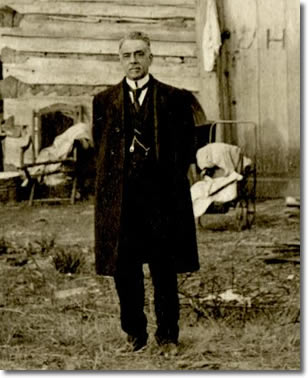James Carroll Napier (1845-1940)
by Linda T. Wynn, Tennessee Historical Commission and Fisk University

Attorney, politician, businessperson, Register of the United States Treasury, and warrior for African American political and social justice, James Carroll Napier was born on the western outskirts of Nashville, Tennessee. His parents, William C. and Jane E. Napier, both slaves at the time of his birth, were freepersons by 1848. James attended Daniel Wadkins’ school for free blacks on Line and High Street (now Sixth Avenue) with some sixty other African American children. A December 1856 race riot forced the school to close, temporarily curtailing educational opportunities for black children in Nashville until February 1862, when Union forces occupied the city during the American Civil War. In the interim, the Napier family and several other free black families sent their children to Ohio to continue their schooling under free black teacher Rufus Conrad.
The young James C. Napier returned to Nashville while it was still held by Union forces and soon became involved in Republican Party politics. John Mercer Langston, an Ohio free black and a friend of Napier's father, visited Nashville on December 30, 1864, to speak to the victorious African American Union troops who had defeated the Confederates at the Battle of Nashville and to deliver an address at the Emancipation Day celebration. Langston, who became a powerful Republican Congressman and the founding dean of Washington, D.C.’s Howard University School of Law, later invited J. C. Napier to attend the law school. After receiving his law degree in 1872, Napier returned to Nashville to practice law. In 1873, he married Langston's daughter, Nettie.
Napier was one of the most powerful and influential citizens in Nashville’s African American community. Between 1878 and 1886, he served on the Nashville City Council and was the first black to preside over the council. Instrumental in the hiring of black teachers for African American public schools during the 1870s, he also fostered the hiring of black detectives and the organization of the black fire-engine company during the 1880s. From 1911 to 1913 he served as Register of the United States Treasury, appointed by President William Howard Taft.
Napier was also a successful businessperson. He was a friend of Booker T. Washington, serving as president of the National Negro Business League (NNBL) that Washington had founded in 1900 and opening a chapter in Nashville in 1905. Napier was a founder of the One Cent (now Citizens) Savings Bank (1904), helped organize the 1905 Negro streetcar strike and the black Union Transportation Company's streetcar lines, presided over the powerful Nashville Negro Board of Trade, and served on the boards of Fisk and Howard universities. Honored by funeral services at the Fisk University Memorial Chapel, his remains are interred in Greenwood Cemetery.
Sources:
Herbert Clark, “James Carroll Napier: National Negro Leader,” Tennessee Historical Quarterly LX, no. 4 (Winter 1990): 243-252.
Bobby L. Lovett, The African-American History of Nashville, Tennessee, 1780-1930: Elites and Dilemmas (Fayetteville: University of Arkansas Press, 1999).
Bobby L. Lovett and Linda T. Wynn, eds., Profiles of African Americans in Tennessee. (Nashville: Local Conference on Afro-American Culture and History, 1996).
Nashville Daily American, 26 May 1890.
Nashville Tennessean, 21 April 1940.
Linda T. Wynn, “James Carroll Napier,” in: Encyclopedia of African American Business, Jessie Carney Smith; Millicent Lownes; Linda T. Wynn, eds. (Westport, CT: Greenwood Press, 2006).
Suggested Citation
Wynn, Linda T. "Sampson Wesley Keeble." Trials and Triumphs: Tennesseans' Search for Citizenship, Community, and Opportunity. Middle Tennessee State University, 2014. Web.